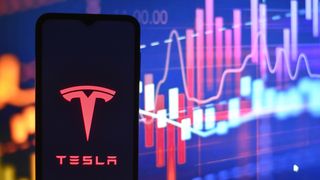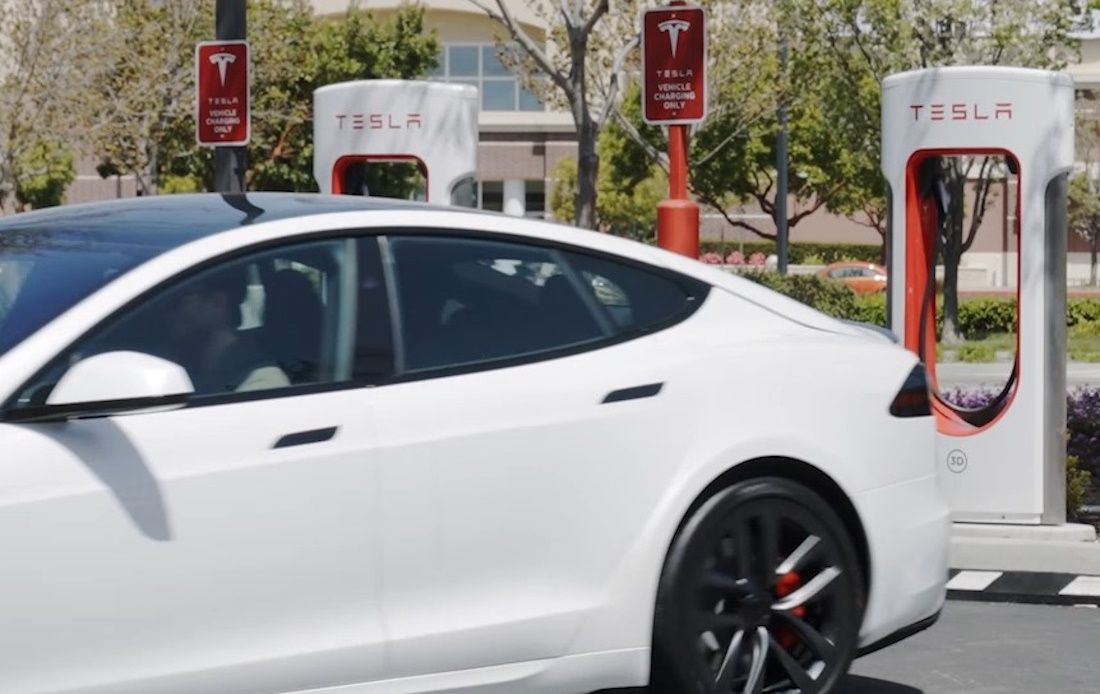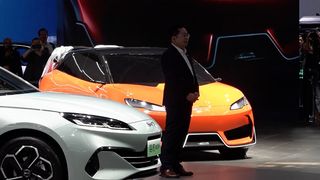d plagiarism by providing your own unique perspective and analysis.
The Future of Electric Car Charging: A Shift in Strategy
Elon Musk’s recent decision to cut back on the development of Tesla’s Supercharger network has sparked a debate about the future of electric car charging. While some see this move as a sign of uncertainty, others view it as an opportunity for the market to evolve and grow.
A Market in Transition
According to Daniel Sperling, founding director of the Institute for Transportation Studies at the University of California Davis, Musk’s decision may actually benefit the entire market. “It’s not in the public interest for one company to be so dominant,” Sperling explains. “This will encourage all charging companies and car manufacturers to invest in creating a reliable charging system.”
With the rise of new players in the electric car charging field, such as ChargePoint and EVgo, the industry is becoming more competitive. Electric car industry analyst Loren McDonald believes that this competition may have influenced Musk’s decision to step back. ”Tesla can slow down a bit, be more strategic, and shift some of the responsibility onto others,” McDonald suggests.
Innovative Solutions for the Future
As the electric car charging market continues to evolve, there are opportunities for innovation and collaboration. One potential solution is the development of a standardized charging infrastructure that is accessible to all electric vehicle manufacturers. This would not only benefit consumers but also streamline the charging process and encourage more widespread adoption of electric vehicles.
Another innovative idea is the integration of renewable energy sources into charging stations, reducing the environmental impact of electric vehicles. By harnessing solar or wind power, charging stations can become more sustainable and contribute to a greener transportation system.
The Path Forward
While Musk’s decision may have raised questions about the future of Tesla’s Supercharger network, it also highlights the need for a more diverse and resilient charging infrastructure. By fostering competition and collaboration among charging companies and car manufacturers, the industry can continue to innovate and expand, ultimately benefiting consumers and the environment.
As we look towards a future powered by electric vehicles, it’s clear that the landscape of the charging market is changing. By embracing new ideas and working together, we can create a more sustainable and efficient electric car charging system for all.
“The good news is that this will encourage all of these charging companies, as well as the car manufacturers, to redouble their investment in creating a reliable charging system.” – Daniel Sperling
“Tesla can slow down a little bit, be a lot more strategic and eventually shift some of the investment and responsibility onto the shoulders of others.” – Loren McDonald
As we navigate this transition, it’s important to stay open to new possibilities and continue to push the boundaries of what is possible in the world of electric car charging.
the following template to structure your article:
The Future of Electric Car Charging Networks
Elon Musk’s decision to cut back on the development of Tesla’s Supercharger network has sparked discussions about the future of electric car charging infrastructure. While some see this move as a sign of uncertainty, others view it as an opportunity for the market to evolve and diversify.
According to Daniel Sperling, the founding director of the Institute for Transportation Studies at the University of California Davis, the dominance of one company in the charging market may not be in the public interest. By encouraging other charging companies and car manufacturers to invest in creating a reliable charging system, Musk’s decision could benefit the entire market.
Electric car industry analyst Loren McDonald suggests that the presence of multiple players in the charging field may have influenced Musk’s decision to step back. This shift could allow Tesla to focus on strategic investments and share the responsibility of expanding the charging network with other industry players.
As the electric car market continues to grow, it is essential for companies to collaborate and innovate to meet the increasing demand for charging infrastructure. By working together to create a seamless and efficient charging network, the industry can ensure the widespread adoption of electric vehicles and contribute to a more sustainable future.
Ultimately, Musk’s decision to scale back on Supercharger development may be a catalyst for positive change in the electric car charging industry. By fostering collaboration and innovation, companies can work towards creating a robust and accessible charging network that meets the needs of electric vehicle drivers worldwide.
Feel free to expand on these ideas and add your own insights to create a compelling and informative article on the future of electric car charging networks.
The Future of Electric Car Charging: A New Era of Collaboration
Elon Musk’s recent decision to cut back on the development of Tesla’s Superchargers has sparked a conversation about the future of electric car charging networks. While some may see this as a setback, others view it as an opportunity for the industry to evolve and grow in a more collaborative way.
According to Daniel Sperling, founding director of the Institute for Transportation Studies at the University of California Davis, the dominance of one company in the charging market may not be in the public interest. With more players entering the field, there is a chance for increased competition and innovation, ultimately benefiting consumers.
Electric car industry analyst Loren McDonald suggests that Tesla’s decision to step back from charging development could lead to a more strategic approach. By sharing the responsibility with other companies, Tesla can focus on other aspects of their business while still contributing to the growth of the charging network.
As the electric car market continues to expand, collaboration among charging companies and car manufacturers will be key to creating a reliable and efficient charging system. This shift towards a more interconnected network could lead to a more sustainable and accessible future for electric vehicles.
Overall, Musk’s decision may mark the beginning of a new era of collaboration in the electric car industry. By working together to build a robust charging infrastructure, companies can ensure the success and widespread adoption of electric vehicles in the years to come.
to the original text in order to create a unique and original article.
The Future of Electric Car Charging: A Shift in the Market
Elon Musk’s recent decision to cut back on the development of Tesla’s Superchargers has sparked a conversation about the future of the electric car charging network. While some may see this move as uncertain, others view it as an opportunity for the market to evolve and diversify.
Encouraging Competition
According to Daniel Sperling, founding director of the Institute for Transportation Studies at the University of California Davis, the dominance of one company in the charging market may not be in the public interest. By stepping back, Musk’s decision could encourage other charging companies and car manufacturers to invest more in creating a reliable charging system. This competition could lead to innovation and improved services for electric car owners.
A Strategic Shift
Electric car industry analyst Loren McDonald suggests that Musk’s decision could allow Tesla to be more strategic in its approach. With more players entering the charging field, Tesla can focus on strategic partnerships and shift some of the investment and responsibility onto others. This could lead to a more sustainable and collaborative charging network in the long run.
The Benefits of Diversification
While Musk’s decision may raise concerns about the future of Tesla’s charging network, it also highlights the benefits of diversification. With multiple companies investing in charging infrastructure, electric car owners may have more options and better access to charging stations. This could ultimately drive the growth of the electric car market and make it more accessible to a wider range of consumers.
Looking Ahead
As the electric car industry continues to evolve, the future of the charging network remains uncertain. However, Musk’s decision to cut back on Supercharger development could be a catalyst for positive change. By encouraging competition, strategic partnerships, and diversification, the market may see new opportunities for growth and innovation in the years to come.
“The good news is that this will encourage all of these charging companies, as well as the car manufacturers, to redouble their investment in creating a reliable charging system.” – Daniel Sperling
“Tesla can slow down a little bit, be a lot more strategic and eventually shift some of the investment and responsibility onto the shoulders of others.” – Loren McDonald
Overall, Musk’s decision may mark a turning point in the electric car charging industry, paving the way for a more competitive and sustainable market in the future.
#Musk #electriccars #chargingnetwork #innovation #competition #sustainability
The Future of Electric Car Charging: A Shift in the Market
Elon Musk’s recent decision to cut back on the development of Tesla’s Superchargers has left many in the industry uncertain about the future of the electric car charging network. With Musk’s announcement that Tesla will be opening up its Supercharger network to other electric vehicles, the landscape of the charging market is set to change dramatically.
A New Era of Competition
According to Daniel Sperling, founding director of the Institute for Transportation Studies at the University of California Davis, the move may benefit the entire market by encouraging competition. “It’s not in the public interest for one company to be so dominant,” Sperling stated. With more players entering the electric car charging field, there will be increased investment in creating a reliable charging system.
Strategic Shift for Tesla
Electric car industry analyst Loren McDonald believes that the increased competition in the charging market may have prompted Musk to shift his focus. “Tesla can slow down a little bit, be a lot more strategic and eventually shift some of the investment and responsibility onto the shoulders of others,” McDonald explained. This strategic shift could allow Tesla to focus on other areas of development while still benefiting from the expanding charging network.
Overall, the changing landscape of the electric car charging market signals a new era of competition and collaboration. As more companies enter the field, innovation and investment are expected to increase, ultimately benefiting consumers and the industry as a whole.
The Future of Electric Car Charging Networks
Elon Musk’s recent decision to cut back on the development of Tesla’s Supercharger network has sparked discussions about the future of electric car charging infrastructure. While some see this move as a sign of uncertainty, others view it as an opportunity for the market to evolve and diversify.
According to Daniel Sperling, founding director of the Institute for Transportation Studies at the University of California Davis, the dominance of one company in the charging market may not be in the public interest. By encouraging competition and investment from multiple players, the industry can create a more reliable and accessible charging system for electric vehicle owners.
With the emergence of new players in the electric car charging field, such as charging companies and car manufacturers, there is potential for innovation and collaboration. Analysts suggest that Tesla’s shift in focus could lead to a more strategic approach, allowing for shared responsibility and investment in charging infrastructure.
As the electric car market continues to grow, it is essential for stakeholders to work together to ensure the development of a robust and efficient charging network. This shift in the industry dynamics presents an opportunity for collaboration, innovation, and sustainability in the electric vehicle ecosystem.
By embracing diversity and cooperation among charging providers, car manufacturers, and policymakers, we can pave the way for a future where electric vehicles are accessible to all, and charging infrastructure is reliable and convenient.
The Future of Electric Car Charging Networks
Elon Musk’s decision to cut back on the development of Tesla’s Superchargers has raised questions about the future of electric car charging networks. While some may see this as a setback, others view it as an opportunity for innovation and growth in the industry.
According to Daniel Sperling, founding director of the Institute for Transportation Studies at the University of California Davis, the shift in focus may benefit the entire market by encouraging competition and investment in creating a reliable charging system. With more players entering the field, there is potential for new technologies and solutions to emerge.
Electric car industry analyst Loren McDonald suggests that Tesla’s decision to step back could lead to a more strategic approach, allowing other companies to take on a larger role in expanding the charging network. This redistribution of responsibility could lead to a more diverse and robust infrastructure, benefiting consumers and the industry as a whole.
As the electric car market continues to grow, it is essential for companies to collaborate and innovate to meet the increasing demand for charging stations. By working together to develop new technologies and expand the network, the industry can ensure a seamless and efficient charging experience for electric vehicle owners.
In conclusion, while Elon Musk’s decision may have raised concerns about the future of electric car charging networks, it also presents an opportunity for collaboration, innovation, and growth. By embracing this change and working together, the industry can create a sustainable and reliable charging infrastructure for the future.


